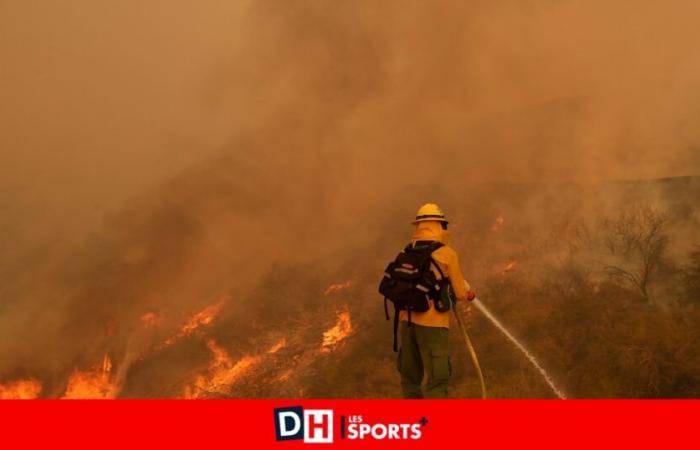
What will be the consequences of this natural disaster of unprecedented magnitude? The point in four questions.
California fires: three people arrested
1. What will be the extent of the damage?
A few days ago, analysts at the American bank JPMorgan estimated that the total amount of insured damage had already reached $20 billion. Total losses for the insurance sector could reach $15 billion, Standard & Poor’s estimated. But according to experts, this should have no difficulty in compensating policyholders, the giants of the sector having large financial reserves.
This reality, however, is an illusion: many market players have in fact significantly reduced their exposure to “California risk”, by leaving this market, by not renewing contracts or by increasing premiums to exorbitant levels, leaving thousands of people on the sidelines. At the start of 2024, State Farm, California’s second largest insurer, stopped covering 72,000 homes, the press agency recently recalled. Associated Press.
Terrible fires in Los Angeles: Tournaisiens David and Melodie lost their villa
So much so that state Insurance Commissioner Ricardo Lara has put in place a one-year protection for homeowners in fire-affected areas against these warranty termination practices. Since the 1960s – proof that the problem is not new but has become more complicated with the increase in extreme weather episodes – the Californian state has set up a public insurance system called FAIR to help to people who are no longer able to obtain cover from the private sector. A sign of the distrust of private actors in wanting to assume risks in this area, FAIR’s financial exposure increased from 50 billion dollars in 2018 to 450 billion currently…
The cost of the fires in Los Angeles, which is added to the consequences of hurricanes Helen in September and Milton in October – the damage of which is estimated at more than 400 billion dollars – should in any case increase the insurance premiums of Americans in the coming months.
2. What about viability in certain areas of the United States?
In addition to the human and financial cost of this disaster, a question arises: will this area still be viable in the years to come, given the multiplication and intensity of this type of disaster? And what climate strategy should be put in place to deal with it? “We are heading towards a future where insurance will be neither available nor affordable.”warns Dave Jones, director of the Climate Risk Initiative at the University of Berkeley, cited in the Washington Post. California is not the only one affected. An American Senate report, dating from last December, also mentioned Florida, Louisiana and Texas. “It all depends on what insurers decide, what risks they are willing to assume and at what prices. We risk seeing more and more of a phenomenon of social stratification where only certain rich people will be ready and able to pay huge premiums to live in certain areas at high climate risk. I don’t think that in the United States, we decide to ban people from living in this or that place. It’s not like in Europe where we see certain prohibited areas linked to flood zones.”explains political scientist François Gemenne.
gullAll the experiences of natural disasters in the United States have paradoxically strengthened climate skepticism. It is rather Donald Trump who will emerge victorious from the current sequence.”
On the question of whether the events in California will have an impact on the climate issue, our interlocutor responds categorically: “Non”. And to conclude: “All the experiences of natural disasters in the United States have paradoxically strengthened climate skepticism. It is rather Donald Trump who will emerge victorious from the current sequence: he had too much political intelligence to look for culprits, for example by attacking the mayor of Los Angeles. The general public is looking for political responsibilities. And since he is not yet in charge, he can always say that this would not have happened if he had been in power at that time. We still have a certain naivety in Europe, that of believing that the multiplication of disasters allows us to redouble our commitment in the climate field. In the United States, the exact opposite is happening…”
3. Will we see an increase in premiums here?
The damage caused in California will obviously have an impact on the major global reinsurance players (Editor’s note: Swiss Ré, Munich Ré, etc.), those to whom all insurers turn to cover part of their risks. With obviously a ricochet, given the financial losses caused by these devastating climatic episodes, an increase in the premiums demanded by these reinsurers from the players in the sector who themselves will ultimately turn to the policyholders. With an impact even in our countries? “Yes, this could have an impact to the extent that insurers transfer part of their risks to reinsurers. If there are more and more natural disasters in the world like these fires in California, this could actually have an upward impact on the amount of fire insurance premiums in our country because reinsurance rates will increase.explains Nevert Dergimenci, press manager at Assuralia, the Belgian federation of the insurance sector.
gullToday, if unfortunately, a natural disaster of a magnitude of 2 billion euros occurred in our country, the sector would not be able to compensate 100% all those affected.”
While specifying that this will not have a character “automatic”. “This will be on a case by case basis. Each insurer will have to translate its perception of the increase in these natural disaster phenomena into premiums. This will depend on the pricing policy of each insurer, as well as its own claims load. Insurers must find a balance between prudent management of their funds while respecting solvency obligations set by the BNB and maintaining affordable premiums so that as many people as possible can get insurance. It should also be remembered that in Belgium, fire insurance coverage is different from that in force in the United States, to the extent that it necessarily covers natural disasters.she adds.
Controversy surrounding pink firefighting powder covering Los Angeles
4. Is Belgium able to cope with a mega natural disaster?
Assuralia calls on the next government to quickly conclude a partnership with the sector to anticipate the risk of a major natural disaster in our country. After the deadly floods in Wallonia in July 2021, the legislator quadrupled the sector’s intervention ceiling on January 1, 2024 to 1.6 billion euros. The final bill to compensate the victims, however, exceeded this ceiling to reach 2.3 billion. The insurers then signed a memorandum of understanding “exceptional” with the public authorities by granting a loan of 1 billion to the Walloon Region over 8 years.
“As we can see, natural disasters are also increasing in Europe. Today, if unfortunately, a natural disaster worth 2 billion euros occurs in our country, and therefore beyond the ceiling which was expected, the sector would not be able to compensate 100% of all victims to the extent that intervention by regional authorities is not planned. We are calling for a balanced partnership and better distribution of risks between the private sector and. THE public authorities”underlines Nevert Dergimenci.





